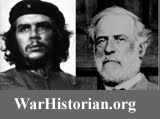Originally published in World War II magazine. Reprinted with permission.
We’ve all attended this meeting, convened by the leadership to discuss some new organizational undertaking and—ostensibly—to collect and synthesize the views of all assembled. Neophytes among us believe that; the more experienced know the score. We enter the conference room resigned, wary, even disposed to revolt. But the leadership has the clout to cram its agenda down our collective throats.
Such meetings occur in all walks of life: governmental, commercial, educational, ecclesiastical. The conference held on January 20, 1942, in Wannsee, a lakeside district southwest of Berlin, was like any other of its kind—except that this meeting was organized by the Schutzstaffel, and its agenda was the destruction of 11 million European Jews.
Directed by Frank Pierson and released in 2001, Conspiracy re-creates the Wannsee Conference in nearly real time, using as a set the mansion in which the actual event took place. Writer Loring Mandel based his script on the “Wannsee Protocol”—the meeting’s top-secret minutes. The original document is deliberately vague; its language gives no hint that the subject is mass murder. Nor does the protocol paint the conference as anything less than wholly harmonious. But anyone who has watched bureaucrats war over turf knows differently, and a close reading of the minutes suggests fault lines and objections. The filmmakers have fleshed these out to deliver a riveting drama that takes place almost entirely around a large conference table.
Conspiracy
opens with SS Lieutenant Colonel Adolph Eichmann (Stanley Tucci) overseeing final
touches for the meeting that include excellent wines, fine cigars, and a lavish
buffet lunch for 15. As they enter, the guests, who represent some of Nazi
Germany’s most powerful men, introduce themselves to one another and the viewer.
Two look decidedly glum: Dr. Friedrich Kritzinger (David Threlfall), deputy
head of the Reich Chancellery; and Dr. Wilhelm Stuckart (Colin Firth), chief architect of the
Nuremberg Laws that have legally stripped German Jews of their civil rights,
defining “Jew” using formulas of Stuckart’s devising. Kritzinger and Stuckart
believe that their offices have resolved the “Jewish question.” Suspicious that
the SS, the meeting’s sponsor, is about to hijack that “question” and impose a
solution of its own, the two quietly grouse to one another.
Last to arrive
is the host, SS Obergruppenführer Reinhard Heydrich (Kenneth Branagh), Chief of
the Reich Security Main Office. Heydrich, who called the meeting, presides with
the jaunty, self-satisfied air of a man who knows that he is going places. He begins
by quoting a directive from Reichsmarschall Herman Goering that assigns
Heydrich to find “a complete solution of the Jewish question in the German
sphere of influence in Europe” and stipulates that relevant government agencies
are to “cooperate” with the security chief in this endeavor. Kritzinger instantly
objects; the Chancellery, he declares, has received no directive on this
subject. He fruitlessly tries to gain a hearing but Heydrich smoothly and
stubbornly plows on, leaving the sidelined Kritzinger to fume.
